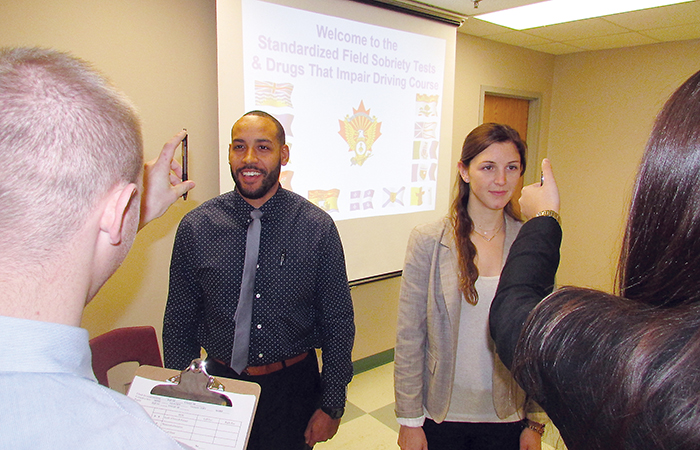
Mere months into their careers as police officers, four Chatham-Kent Police Service constables received an intense course in testing drivers for signs of impairment.
The course took place in Chatham, and included test subjects who had been consuming alcohol.
Constables Danica Quenneville, Destiny Pailey, Kyle Wright and Trevor Biskey took part in the program. They all joined the service in April.
Const. Chris Baillargeon, the lead instructor, said the training teaches the officers what to look for in terms of signs of impairment.
“The odour on their breath, bloodshot eyes or slurring of speech,” he said are big indicators.
Some people can show little signs of impairment. They speak fine, despite having ingested more than the legal limit of alcohol. But Baillargeon said the eyes don’t lie.
“They can’t get used to the alcohol,” he said.
The eye test, where an officer holds a pen or a finger at eyebrow level several feet in front of the subject, and then moves it from side to side, telling the subject to follow it only with their eyes, lets the officer observe involuntary eye movements.
Such movements are small twitches for a typical sober person and are barely perceptible even to a trained eye, but add alcohol and those twitches become more pronounced.
Pailey said the recent field sobriety training provides officers with added insight and knowledge at an early stage in their careers.
“As a young officer, we have been exposed to some of this … of what it is going to look like on the road,” she said. “All four of us have dealt with people with substances in their systems. It depends on the day, it depends on the situation as to how the person responds.”
As part of the in-house testing, the four officers spent two days with test subjects that consumed various quantities of alcohol and showed different levels of impairment.
In a couple of cases, the subjects consumed large quantities of alcohol, but on quick inspection showed little, if any, signs of impairment … until the officers in training performed the eye test.
Wright said the training with the subjects has illustrated the need for officers to know what they are doing in conducting the field sobriety testing.
Baillargeon said the officers are being trained to determine if a driver is showing signs of having more than 80 milligrams of alcohol per 100 millilitres of blood. But three-day suspensions occur at 50 mgs.
“If they feel the driver is over 80, then they are going to bring them in. If not, they would administer an alcohol screening device test to see if it shows a warning,” he said.
The field sobriety course also included education on what to look for in a driver for signs of impairment by drugs.
Baillargeon said a standard field sobriety test officer may test a driver for alcohol impairment, but if they feel the driver isn’t impaired by alcohol, they have the power to arrest for drugs and to bring the driver into the station for follow up testing.
If a drug recognition expert officer is not available, the field sobriety test officer can evaluate the driver and give a three-day license suspension, he said.
With changes to the Controlled Drugs and Substances Act coming, more is being done to train up officers.
“The government has just recently supplied funding for the training before the new legislation comes into power,” Baillargeon said. “We want them to have this training.”
Wright said such training is “really beneficial” and helps officers when on patrol.
He explained a police officer can’t just pull a car over without cause.
“We can’t just arbitrarily pull over a vehicle. We have to observe for a time. Swerving is a telltale sign,” he said of an impaired driver. “There are symptomologies in place and sensory changes.”
But once a vehicle is pulled over, these constables are now armed with the knowledge on how to conduct field sobriety tests, such as testing a driver’s motor skills by having them walk heel to toe, and then testing the eyes.
Baillargeon said typically field sobriety training takes place at out-of-town sites such as the police college in Aylmer.
“Two years ago, I trained 12 people. This will be another four. But this is the first time for Chatham-Kent training in our facilities,” he said.






